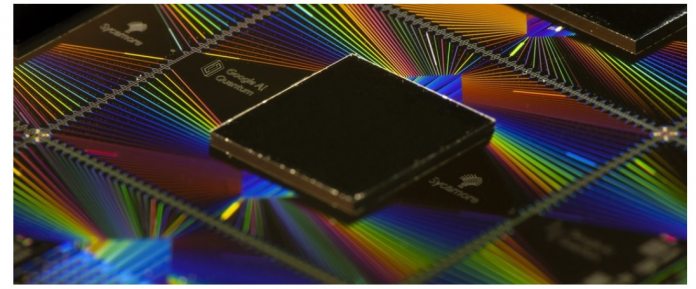Google has made significant progress toward building a large-scale quantum computer, according to a blog post by its CEO Sundar Pichai. The company claims that its quantum computers can now perform error correction, a crucial step for achieving reliable and scalable quantum computation.
Error correction is the process of detecting and correcting errors that occur in quantum bits (qubits), the basic units of information in quantum computing. Qubits are extremely sensitive to noise and interference from their environment, which can cause them to lose their quantum state and produce incorrect results. To overcome this challenge, researchers use multiple physical qubits to encode a single logical qubit that can withstand errors.
Error Correction Uses Physical Qubits to Encode Logical Qubits
In his blog post, Pichai says that Google’s quantum computers have successfully demonstrated error correction using 54 physical qubits to encode one logical qubit. He also says that Google has developed new algorithms and hardware architectures that can reduce the number of physical qubits needed for error correction by up to 75%.
Pichai describes this achievement as “a major step forward on our roadmap toward building a large-scale quantum computer” and “the next chapter in our journey toward quantum advantage”. Quantum advantage or quantum supremacy refers to the point where quantum computers can perform tasks that are impossible or impractical for classical computers.
Race against IBM, Microsoft, Amazon and Intel
Google is not the only company working on quantum computing. IBM, Microsoft, Amazon, Intel, and others are also developing their own quantum technologies and platforms. However, Google was the first to claim “quantum supremacy” in 2019, when its 53-qubit processor Sycamore performed a calculation in 200 seconds that would take a supercomputer 10,000 years. Rival IBM rejected these claims back then, arguing that Google’s understanding of quantum supremacy was not right.
Quantum computing has the potential to transform various fields such as cryptography, artificial intelligence, chemistry, and physics. Pichai says that Google is committed to advancing this technology for the social good and collaborating with other researchers and organizations around the world.
Tip of the day: Do you know that Windows 11 / Windows 10 allows creating PDFs from basically any app with printing support? In our tutorial, we show you how this works via Microsoft Print to PDF and Bullzip PDF Printer to save a PDF from any app, even with advanced options like adjusted quality, multi-page printing, and password protection.





